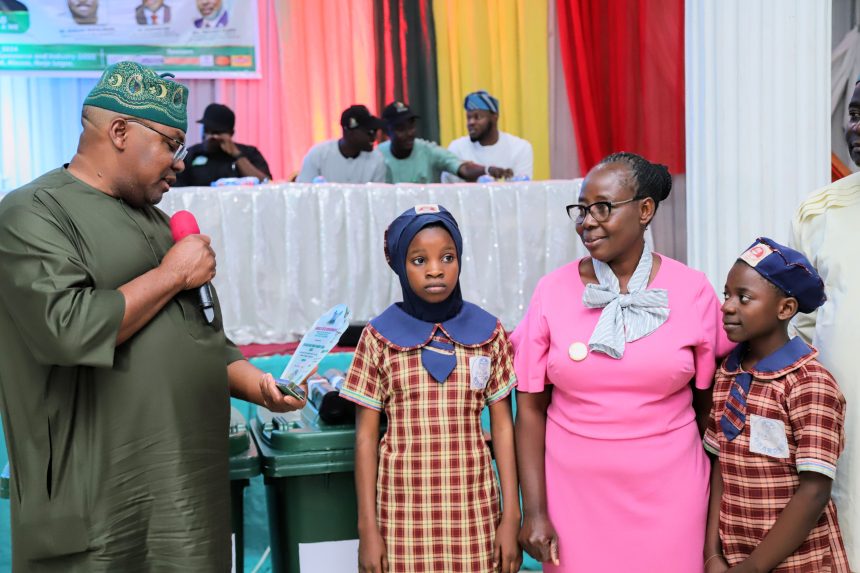The Lagos State government on Wednesday reiterated the collective participation of everyone to advocate for an improvement in school sanitation infrastructure with the promotion of awareness campaigns in all schools across the metropolis.
The Commissioner for the Environment and Water Resources, Mr. Tokunbo Wahab, made this known at the Stakeholders Interactive Session on School Sanitation held at the Lagos Chamber of Commerce and Industry LCCI Conference Centre, Ikeja, saying it was imperative for stakeholders to mobilize resources to address these gaps in all schools.
The commissioner who spoke through the Permanent Secretary, Office of Environmental Services, Dr. Gaji Omobolaji, said best sanitation and hygiene practices were the foundation of a healthy learning in any environment.
He added that it was within the walls of schools that the future leaders lives were shaped, as such it was the duty of everyone to ensure that the young minds grew up under the proper conditions that supported both their education and health.
He described this year’s theme, “Embracing Sanitation and Hygiene Behavior in Schools in Lagos State,” as very apt, adding that schools were more than just places of learning but places where values, attitudes, and behaviours were formed.
He said: “Together, we can create a school environment in Lagos that promotes good health, dignity, and equality for all children. This is our shared responsibility, and I am confident that, united in purpose, we can achieve this vision for our children.”
Wahab said when best sanitation practices were embraced, it would not only benefit the students but also the immediate families and the community at large, adding that the government recognized that some challenges might exist but not insurmountable.
READ ALSO: Bandits kill abducted district head of Kanya in Kebbi
He said inadequate sanitation and poor hygiene were barriers to education, particularly in schools where access to clean water, proper toilet facilities, and knowledge of hygienic practices was limited, stressing that everyone must work to ensure that no child, regardless of gender or age, was left behind in the cause.
He said the present administration placed significant emphasis on Health, Environment, Education, and Technology under the T.H.E.M.E.S (+) agenda saying towards that end, the ministry collaborated with relevant MDAs and Corporate Organizations on sustainable intervention projects/programmes to ensure that best sanitation practices were embraced in all schools in Lagos through effective monitoring.
He added that the ministry had set sanitation standards in schools especially in the area of accreditation process for the establishment of private schools in the state saying the success rate had moved from 10% in the year 2021 to 65% in 2023 through a collaboration with Office of Education Quality Assurance.
The commissioner said this year’s Sanitation Competition Assessment had revealed the need for more collaborations with government, corporate sectors, parents, NGOs and CSOs to ensure that sanitation infrastructure in schools were not only available but adequate in relation to pupils’ population, accessible and well maintained.
“I urge everyone of us to become worthy ambassadors for change. Students, you are the most important stakeholders in this journey; Embrace the principles of good hygiene; wash your hands with soap and water; keep your environment clean, and be mindful of waste disposal,” he said.
He called on teachers to continually educate and empower the students to take charge of their health saying it was important for parents and community members to support the schools in their sanitation efforts and advocate for improvements where needed.
He emphasized that by embracing sanitation and hygiene behaviour, “we lay a solid foundation for a healthier future for the city and nation”, adding that every child deserved the opportunity to learn in an environment that was safe, clean, and supportive of their overall development.
Earlier in his welcome address, Director Sanitation Services, Dr. Hassan Sanuth, said access to safe water, sanitation and hygiene was an important basic human need for the health and well-being of everyone.
He added that in the year 2022, United Nations reported that 2.2 billion people still lacked potable water; 703 million without basic water service; 3.5 billion people lacked safely managed sanitation; 1.5 billion without basic sanitation services; 2 billion lacked basic handwashing facility and 653 million with no hand washing facility at all.
The guest lecturer, Mr Dare Oduniyi, from Water Aid Nigeria, who spoke on the topic “Sanitation and hygiene best practices in schools” stated that, optimal performance could only be gotten from students with a good sanitary environment “which is safe and conducive for physical, mental and emotional health of the child to achieve maximum benefits from educational benefits.”
He stated that Sanitation and Hygiene Matter in schools would improve student well-being and Increase productivity as well as boost community development.
One of the high point of the event was the presentation of gifts and awards to schools in two categories which is the Sanitation and Hygiene Best Practices category as well as Recycling and Up-cycling Initiatives category.














